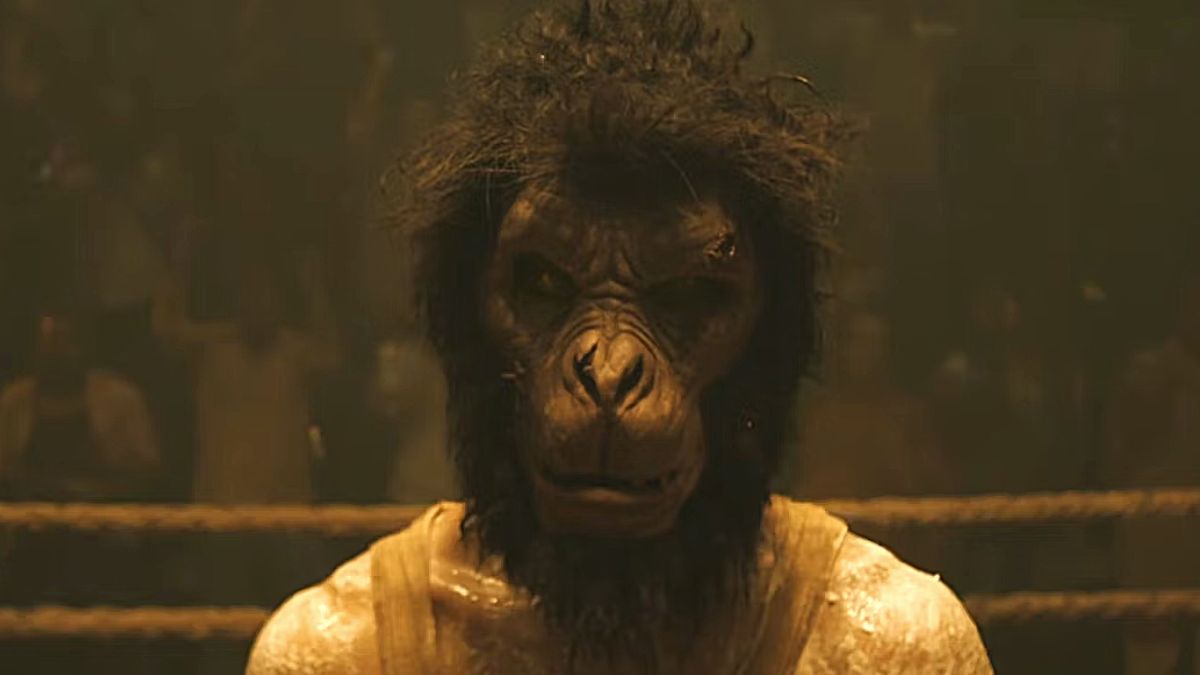Dev Patel is a person of motion, and that may be utilized to not less than two totally different dimensions with regards to his directorial debut and keenness mission Monkey Man.
The movie was born out of Patel’s need to inform this story, and when his first alternative of director — Neill Blomkamp, who directed him in 2015’s Chappie — turned down the mission because of the cultural data and understanding the script demanded, the Oscar-nominated actor took a leap of religion and took on the position himself. By Patel’s personal account, manufacturing was chaotic. The pandemic’s border restrictions meant shedding a very good portion of the workforce and swapping the Indian setting for an Indonesian island, however there have been additionally financing issues, damaged cameras changed by Patel’s telephone, damaged bones, and even the loss of life of a gaffer from a coronary heart assault. Nothing, nonetheless, may cease Patel from ending the movie.
Patel isn’t just a person of motion, although ⏤ he’s additionally a fan of it. Monkey Man is an ode to the actor’s favourite motion movies, from South Korean revenge thrillers like Oldboy and The Man from Nowhere to Bollywood motion pictures, Indonesia’s cult traditional The Raid to Hong Kong’s martial arts heroes like Bruce Lee and Sammo Hung, and naturally John Wick, which even will get its personal cheeky point out within the movie. It’s clear that the particular person behind the movie not solely appreciates the motion style, however celebrates it and strives to raise it. That’s additionally the advantage Jordan Peele noticed in it when he determined to purchase it from Netflix by means of his manufacturing firm, Monkeypaw Productions, and take it to Common for distribution.

In Monkey Man, Patel takes the archetypal motion movie to new heights by infusing it with a wealthy cultural historical past, background, and motivation. The movie follows Child (Patel), a fighter in an underground ring who will get paid to lose and whose mom Neela (performed by Adithi Kalkunte) was killed by a policeman (Sikandar Kher’s Rana) when he was a toddler. His entire life, he’s been planning a solution to get to this man and avenge her loss of life, however by means of that journey and the individuals he meets alongside the best way, he acquires a a lot deeper incentive that turns his private quest for vengeance right into a struggle for social justice.
The idea is laudable, visionary, and bold — maybe an excessive amount of so. The primary hour of Monkey Man is as agency and punchy as its main man, however the extra parts which are added and the extra its entropy will increase, the extra Patel struggles to maintain his regular grip on the story, and extra particularly, its tone.
There’s a wealthy tapestry of characters that come collectively to color a vivid image of India’s caste system, represented visually and actually within the type of the elevator that takes Child from the steamy, packed, and closed-off kitchen of the luxurious brothel his nemesis frequents to the spacious and floor-to-ceiling window-covered penthouse that’s solely accessible to the madam (Queenie, performed by Ashwini Kalsekar) and her most esteemed company. The construction of the hero’s journey within the movie, all through which Child takes down each rank to get to the “closing boss,” lends itself completely to the caste system. This parallelism in Patel’s underdog story is fascinating to observe, even when he bites off greater than he can chew (nearly actually at instances, as a result of there’s numerous biting on this movie).

After Child’s first failed try and take out the corrupt policeman who killed his mom, he’s rescued and brought in by a gaggle of Hijra (South Asia’s third gender group), whose guru guides him to a more recent, wider goal. That is the second the place his preliminary plan transitions into one thing a lot deeper, and Child goes on, now not preventing only for his trauma, however for everybody else’s, too. This alteration occurs in tandem with the reveal of additional, extra vital particulars about Neela’s killing, which in flip additionally re-calibrates the viewer towards a brand new, way more preserved enemy that had been behind Rana’s actions all alongside. Corrupt police are a frequent enemy of the individuals in life and movie, however this new goal provides a way more complicated and sinister layer to the story that Monkey Man by no means actually manages to totally grasp, regardless of its finest and most sincere makes an attempt.
Religion in the end holds the most important weight out of Monkey Man‘s many parts. It evokes not solely Child’s preventing ring persona, but additionally the movie’s title and the course the narrative in the end takes. It opens with Neela telling a younger Child in regards to the legend of Hanuman, the half-monkey, half-human Hindu god who mistook the solar for fruit and tried to eat it as a toddler, consequently receiving punishment from the gods. The deity options ceaselessly all through the movie, usually as a part of Child’s personal non secular awakenings, but additionally as a cultural parallel for his timeless plight as an underdog squaring up towards those that exploit and abuse him and his class friends. Nonetheless, a deeper data of Hanuman’s folklore is required to grasp all of the symbolism Patel inserted into the protagonist and his journey. Because of this, though conceptually and visually fascinating, this factor of the story may show troublesome to know for a wider, Western viewers (which, though worthy of discover, isn’t problematic in itself, and will generate a number of post-viewing analysis and theorizing that might lengthen Monkey Man‘s longevity).

It’s clear and admirable what Patel is making an attempt to perform right here, however these many parts are arduous to efficiently mix and see by means of even for probably the most skilled of filmmakers, so it’s solely pure that the first-time director can’t fairly carry Monkey Man by means of to the end line. Points of the various themes are both overly complicated or over-simplified to serve the central revenge plot, and a few cliché moments come near spoiling the gravitas that in any other case defines the movie.
Regardless, Monkey Man is chock-full of memorable sequences and showstopping gasp-for-air moments emphasised by ingenious struggle choreography, directing, pictures, and modifying. There’s evident aptitude and thrilling type in Patel’s filmmaking imaginative and prescient, and his charisma each behind and in entrance of the digicam is plain — in spite of everything, there aren’t many eyes within the enterprise as expressive as his. The multi-hyphenate actor-writer-director showcases a radical syntony with the story and its message, but lacks the language to totally translate it to the display. Nonetheless, we are able to simply discern what it was that he wished to do with this movie, and his try is earnest and fierce sufficient to hide a few of its most blatant flaws.
If something, Monkey Man is definitive proof of why Patel has constructed a profession as a number one man straight off of Skins and proven no indicators of slowing down since. It’s additionally a optimistic signal that he would possibly take that vitality and put it into constructing an equally thrilling profession as a director.
Good
The center Dev Patel put into ‘Monkey Man’ is evident at each flip, however the actor-turned-director might need bitten off greater than he may chew in his behind-the-camera debut.
Monkey Man


